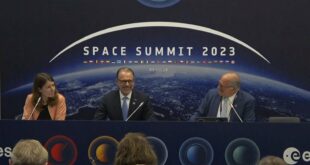
On 6 April 2020, US President Donald J. Trump signed an Executive Order (EO) on Encouraging International Support for the Recovery and Use of Space Resources. This order addresses US policy regarding the recovery and use of resources in outer space, including the Moon and other celestial bodies. Over the next few weeks, SpaceWatch.Global will publish a range of perspectives supporting and opposing the EO from experts around the world. Today’s two expert perspectives come from Professor Dr. Kai-Uwe Schrogl of Germany (below) and Professor Steven Freeland of Australia (see here).
The Executive Order states that the U.S. will conduct its activities “consistent with applicable law.” The U.S. Government has repeatedly confirmed its dedication to the rule of law in outer space. This is a positive commitment.
Amongst the applicable, binding law, relevant to the recovery and use of space resources is Art. II of the 1967 Outer Space Treaty: “Outer space, including the moon and other celestial bodies, is not subject to national appropriation by claim of sovereignty, by means of use or occupation, or by any other means.” No single State, or groups of States, can create norms and practices in conflict with this provision. Any activity of any State, which is not in accordance with this provision is in contradiction to binding international law. An authoritative interpretation of this and other relevant provisions of the Outer Space Treaty can only be undertaken by the entirety of the States Parties to the treaty. Any new provisions for binding international space law have so far only emanated from global international negotiations in global forums as the United Nations Committee on the Peaceful Uses of Outer Space, reporting to the UN General Assembly, or from the International Telecommunications Union.
Concerning the Moon Agreement, which has been adopted by unanimity in the UN General Assembly in 1979, there has been a development of slow but continuous increase of parties to this agreement also due to continuous exchanges in UNCOPUOS and the experience with the Deep Seabed Mining regime of the Law of the Sea.
In the past decades, international law of the “global commons” has maintained the understanding that a “first-come-first served” should be avoided in view of a responsible and sustainable use open for all, including the late comers. Space exploration and use has so far been governed by these principles and the rule of law in general. This should be conserved for the benefit of all, today and also in the future.

Prof. Dr. Kai-Uwe Schrogl presents this viewpoint in his capacity as President of the International Institute of Space Law (IISL). He is currently seconded from the European Space Agency ESA to the German Federal Ministry for Economic Affairs and Energy in Berlin to support the preparation of the German Presidency of the Council of the European Union in the second half of 2020. Until 2019, he was the Chief Strategy Officer of ESA (Headquarters in Paris, France). From 2007 to 2011 he was the Director of the European Space Policy Institute (ESPI) in Vienna, Austria, the leading European think tank for space policy. Prior to this, he was the Head of the Corporate Development and External Relations Department in the German Aerospace Center (DLR) in Cologne, Germany. Previously he also worked with the German Ministry for Post and Telecommunications and the German Space Agency (DARA) in Bonn, Germany. Kai-Uwe Schrogl has written or co-edited 20 books and more than 140 articles, reports and papers in the fields of space policy and law as well as telecommunications policy. He launched and edited until 2011 the “Yearbook on Space Policy” and the book series “Studies in Space Policy” both published by ESPI at SpringerWienNewYork. He sits on editorial boards of various international journals in the field of space policy and law (Space Policy, Zeitschrift für Luft- und Weltraumrecht, Studies in Space Law/Nijhoff; previously also Acta Astronautica).





